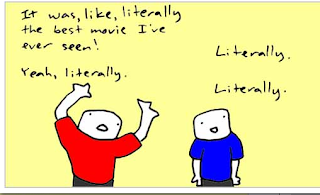Because you hear it on the BBC’s
Today programme or said by the Prime Minister’s spokesman doesn’t make it
acceptable English. John Humphrys, one of the presenters on the BBC’s Today programme has written at least two
books on the English language: Lost For Words: The Mangling and Manipulating
of the English Language’ insists that laBeyond Words’.
He is a much-respected journalist and broadcaster, he’s Welsh and therefore
knows a thing or two about language. All this does not stop him from using a bunch and stuff as well as give us a
sense of. I wish he wouldn’t. One of his colleagues, Sarah Montague, when
asked the other morning: how are you?
replied: Good. I really wish she
wouldn’t. John Humphrys is guilty of using sloppy Americanisms and Sarah
Montague of using sub-standard English. I should like them to be role models
for what used to be known as the Queen’s
English, to be people that
learners of English could use as a reference.
nguage should be simple,
clear and honest, and ‘
By drawing attention to the
following points, a few among many, I hope that learners of English will resist
the temptation to imitate the unfortunate habits of rather a lot of native
speakers who don’t care or who don’t know any other way of expressing
themselves. They follow verbal fashion and are often difficult to understand. I
know that sounds conceited, but that’s because I feel strongly about good English. An (*) indicates an
incorrect form, a solecism.
Fewer / less
*The less people who know, the
better. *He made less mistakes in the previous match.
This one is a marathon-runner; it
just keeps on going. In 2008, Tesco raised the hackles of many people by
putting up a sign at a till saying *10 items or less. They chose to replace it
by “Up to 10 items” rather than “10 items or fewer” on the grounds that it was
easier to understand. I suppose this might be called dumbing-down and may
explain why a lot of people have a problem with this distinction.
It's interesting to note that
"The less people know, the better" is grammatically a perfectly good
statement. So it's not simply a question of collocation.
Figures / numbers
It is now fashionable among some
financial journalists and analysts to talk about “the numbers” and nothing but
the numbers. There are stock market numbers, companies publish their numbers,
numbers are good or bad. Figures are disappearing. Why? This is American
influence again. Perhaps they think it sounds more professional or with it to
say numbers all the time. Numbers are mathematical symbols. When they have been
processed in some way, they magically become figures. Companies publish figures
or why not results? Numbers are things you dial on a telephone, or they
identify the house in the street where you live.
Station / train station
More transatlantic influence.
There is a concept known to linguists as “marked / unmarked terms”. It’s a most
useful idea, beautifully illustrated by this present pet hate of mine. In
British English, Station is unmarked,
it’s neutral, it's the place where you go to catch a train. Marked forms of station are bus station, power station, police station. If you want to use a
marked term to make sure there’s no misunderstanding about where to meet
somebody, why not call it a railway
station like we always have done.
Queue / Stand in line
This is moving in at a rapid
pace. Admittedly, queue is a funny
one to spell but is that an excuse for everybody to stand in line?
*For John and I
This is said by people who care
about the language, who have been taught at school that there’s something to be
careful about here but have forgotten what it is. What they were told is that John and I are great mates, but they don’t
like John and me. They explained this to John and me, but we didn’t understand.
After a preposition or as the object of a verb I becomes me. It happens
with the other pronouns, too: he/she/we/they
become him/her/us/them. It doesn’t
drive me mad, but when I hear it used correctly, I always mentally give the
speaker a couple of gold stars. A current TV advert for mis-sold insurance
claims, includes the following:..that
have been sold to you and I.
Out there
Out there is a very
frequently-heard thinking-stopper. It means everything and nothing. Its precise
meaning is what its two words indicate and no more. It’s best to leave it out.
Stuff
What can I say about “stuff”,
except “ouch”, another thinking-stopper. It seems to have completely taken over
from “things”, our own British home-grown thinking-stopper.
How are you? – *good
Another one moving in fast under
American influence. The cost of this type of fashion is that a pair of words,
in this case good/well, is reduced to one. The other one disappears in a
relatively short space of time and we have permanently lost a useful shade of
meaning.
Meet with
Nobody meets anybody anymore, but
they constantly meet with somebody. This has now got its feet under the table.
When I hear that somebody has met somebody, I pause for a few seconds and give
thanks.
Basis points
The British fashion-oriented
financial brigade ought to sort this one out. It's been around for a while, but
some of them still seem to think it's smart to use this American mumbo-jumbo.
Do 50 basis points better or more clearly express one half percent? Are 30
basis points 0.3% or not? Is it supposed to be simpler? It's nothing but
another useless layer of jargon
Sense
I am now finding the use of sense enervating: give us your sense of the situation, which has the value of understanding or feeling, is as annoying as give
us your take on the situation, another horror. If this continues much
longer the verbal use of sense: do you
sense that this situation is getting out of control? and the nominal use: common sense, the five senses, what sense are
you giving to this expression? are going to become confused. People will
begin to hesitate and possibly even avoid using the word.
If you listen to journalists,
there are specialists of the “one sense
fits all” school, like Norman Smith on the BBC. His excellent reports and
analyses contain lots of my sense of the
situation, which is a pity. This usage is taking over at the BBC.
To Grow a company
Growing companies now happens all the time. Tomatoes or potatoes, yes,
but companies, no.
Deliver
Everything is now delivered,
including education, policing and government. Provided? Nothing at all?
Impact
Earnings were impacted by the decline in oil prices, hit or
affected will do the trick. French needs this verb and has taken it. English doesn’t.
Used as a verb, there is a sense of physical contact, collision.
Bunch
A bunch of grapes, bananas, even a bunch of fives or hooligans, but
not a bunch of files, companies or books.
Key
When I was at school, we were not
allowed to use the adjective nice,
felt to be lazy, over-worked and almost meaningless, and we had to find another
word. I feel the same way now about the adjectival use of key. It has traditionally been used attributively as in key player, key industries, key factor.
It began to be used predicatively around 1970 and, like knotweed, is now all
over the place. Everything is key,
factors are key to our success, the use of military force is key in this
strategy. Hardly anybody says vital or
crucial any more. These two
adjectives are under threat.
To gift
27 per cent said they had gifted their items in the last month
(given away?)
To Pause
As a precaution the UK's A400M
aircraft are temporarily paused
(grounded?)
Referencing
Referencing Conservative pledges to cut the welfare budget
(regarding?)
Post
Post 1945. Post bellum, post hoc.
But, Post the EU referendum? Post lunch?
Multiple
It’s everywhere, multiple
sandwiches, multiple buses, multiple pairs of shoes. This used to be very restricted
in use: multiple injuries, fractures etc. Several
and many are going to disappear.
Firefighters
Firemen have disappeared.
First responders
Emergency services says it so much better.
Shooter
This is slightly ridiculous;
makes me think of pea-shooter or the dated
slang word for a pistol. Have
Americans forgotten the word gunman or
sniper?
It’s all about a lack of
elegance, style. Standards unfortunately only go in one direction, South, and
that’s another one that should be on my list.









